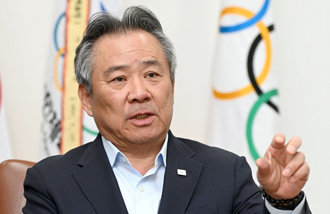Top financial regulator urges affiliate spinoffs by savings banks
Top financial regulator urges affiliate spinoffs by savings banks
Posted September. 23, 2011 02:59,
Financial Services Commission Chairman Kim Seok-dong said Thursday, I will recommend that savings bank groups with several affiliate savings banks split and sell their affiliates.
Kims comment is interpreted as an attempt to preemptively restructure savings banks that are vulnerable to a sudden downturn due to their large sizes though their financial status is relatively sound.
If savings banks grow bigger, they can poorly manage their businesses, he told The Dong-A Ilbo at his office. He meant that the financial watchdog should prevent a savings bank group from causing the group to poorly perform by extending loans to risky businesses, such as real estate project financing, with deposits from their affiliate savings banks.
His comment apparently hints at restructuring of well-performing savings banks in the wake of the latest suspension of seven ailing banks.
The following is excerpts from the Dong-A interview.
Dong-A: Has restructuring of the savings bank sector ended?
Kim: There will be no more suspension of operations. We will now focus on preventing well-performing savings banks from growing bigger by adding affiliates. We will not only prohibit savings banks from adding affiliates but also force those with many affiliates to get slimmer by selling affiliates. Some will say, Kim Seok-dong is pushing ahead with his plan again, but this is necessary.
Dong-A: A list of six savings banks that escaped suspension but need improvement in management is circulating in the stock market.
Kim: This is wrong. Since the list was based on assumptions, part of it might be correct but it`s mostly nonsense. In the latest measure, we put particular emphasis on security. I ordered my staff not to report to me the list of savings banks whose operations will be suspended in the middle of management reviews of savings banks. I was surprised at the final list for suspension as it contained savings banks I never expected to be on the list.
Dong-A: Many have criticized savings banks for degenerating into the private piggy banks of major shareholders.
Kim: This is a chronic problem. Management assessment has discovered many illegal practices such as granting credit to major shareholders and giving loans that exceed credit limits. No large-scale irregularities were found like that seen with Busan Savings Bank in the first half this year, however.
Dong-A: Do you have any system to reform?
Kim: The ceiling of the depositor protection that guarantees up to 50 million won (41,900 U.S. dollars) in deposits should be lowered. Depositor protection is partly attributable to moral hazard at savings banks and customers. The former attracted deposits with high interest rates and the latter deposited their money despite high risk. Calling the head of a savings bank CEO is inappropriate as well.
Dong-A: Some say debt-to-income ratios should be raised to revive the property market.
Kim: We will make no change to debt-to-income ratios. The problem with the property market is structural. Commercial banks have no room for additional lending and demand for housing is weak. Gone are the days when housing prices were supported by injection of liquidity into the market.
Dong-A: Is the governments policy of reducing household debt (austerity policy) on a collision course with an economic stimulus measure (injection of liquidity)?
Kim: It is to a certain extent. But we cannot focus on one measure while giving up the other. For instance, if we cut liquidity in the market to reduce debt, this will deal a blow to the real estate market and hit individual households. So we need policy coordination that considers both sides of the coin.
Dong-A: Some say your leadership has weakened.
Kim: I began work two days before I receive a certificate of appointment from the president on Jan. 3. I have strived to reduce household debt and maintain soundness of the foreign exchange market and the savings bank sector. In particular, I have urged banks to reform themselves to prepare for a crisis. A case in point is the measure to secure sources of foreign currency lending and rescheduling of foreign currency loans that reach maturity. Despite this, some said, Kim Seok-dong is fostering a crisis. I thought it was unfair but I said nothing.
legman@donga.com
Headline News
- ‘Literature class with Han Kang’s writing for 10 years,’ says Oxford professor
- Gold price reaches new record high
- Moon Da-hye appears at police after drunk driving accident
- N. Korea redefines S. Korea as ‘hostile state’ in revised constitution
- Samsung develops graphic DRAM with industry-leading capacity and speed







